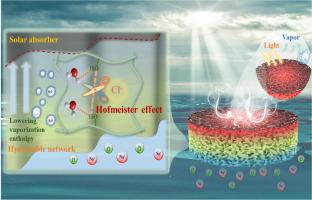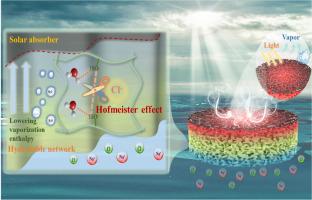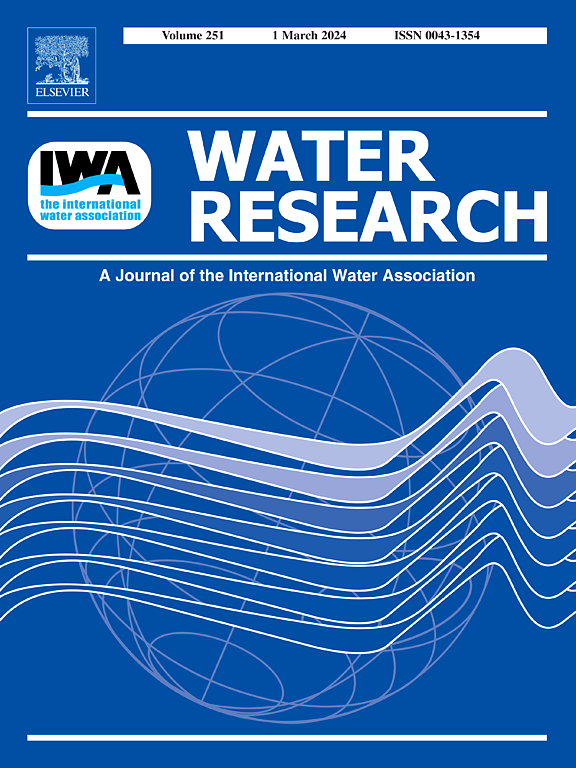Hofmeister effect induced water activation of hydrogel and its applications for the accelerated solar evaporation in brine
IF 11.4
1区 环境科学与生态学
Q1 ENGINEERING, ENVIRONMENTAL
引用次数: 0
Abstract
Solar-driven desalination has emerged as a promising approach to address water scarcity caused by the decreasing supply of freshwater. Reducing the enthalpy of water vaporization is crucial for enhancing the efficiency of solar-powered desalination. In this study, inspired by the Hofmeister effect, we developed a highly hydratable network hydrogel evaporator to achieve a superior evaporation rate in brine compared with pure water. The evaporator comprised a carbonized layer as the photothermal layer and a chitosan aerogel hydrogel as the hydratable matrix. The hydrogel exhibited a dramatically reduced vaporization enthalpy of 1397 J/g and a significant evaporation rate of 2.38 kg m−2 h−1 when exposed to seawater. These results demonstrated the superior performance of hydrogel compared with pure water (1.91 kg m−2 h−1). Excellent evaporation rates and outstanding salt resistance ensured efficient coordination for practical long-term desalination applications. Further investigations revealed that the remarkable evaporation performance of the carbonized chitosan (CCS) hydrogel in brine environments was attributed to its hydrability, which was regulated by Cl−. According to the Hofmeister effect, Cl− accelerated the hydration chemistry in CCS and suppressed the associated crystallinity, which resulted in a lower enthalpy of vaporisation owing to a higher amount of intermediate water. With its superior evaporation performance in brine and comprehensive theoretical simulation analysis, this study presents an achievable and economical strategy for simultaneously addressing the water and energy crises.


霍夫迈斯特效应诱导的水凝胶水活化及其在盐水中加速太阳能蒸发中的应用
太阳能驱动的海水淡化已成为解决淡水供应日益减少造成的水资源短缺问题的一种有前途的方法。降低水的汽化焓对于提高太阳能海水淡化的效率至关重要。在本研究中,受霍夫迈斯特效应的启发,我们开发了一种高水合性网络水凝胶蒸发器,使其在盐水中的蒸发率优于纯水。该蒸发器由作为光热层的碳化层和作为可水合基质的壳聚糖气凝胶水凝胶组成。水凝胶在海水中的蒸发焓大幅降低至 1397 J/g,蒸发率显著提高至 2.38 kg m-2 h-1。这些结果表明,与纯水(1.91 kg m-2 h-1)相比,水凝胶具有更优越的性能。优异的蒸发率和出色的耐盐性确保了长期实际海水淡化应用的高效协调。进一步的研究发现,碳化壳聚糖(CCS)水凝胶在盐水环境中的出色蒸发性能归功于其受 Cl- 调节的水合性。根据霍夫迈斯特效应,Cl- 加快了 CCS 中的水合化学反应,抑制了相关的结晶性,从而使中间水量增加,降低了蒸发焓。凭借其在盐水中的卓越蒸发性能和全面的理论模拟分析,本研究提出了一种可同时解决水危机和能源危机的可行且经济的策略。
本文章由计算机程序翻译,如有差异,请以英文原文为准。
求助全文
约1分钟内获得全文
求助全文
来源期刊

Water Research
环境科学-工程:环境
CiteScore
20.80
自引率
9.40%
发文量
1307
审稿时长
38 days
期刊介绍:
Water Research, along with its open access companion journal Water Research X, serves as a platform for publishing original research papers covering various aspects of the science and technology related to the anthropogenic water cycle, water quality, and its management worldwide. The audience targeted by the journal comprises biologists, chemical engineers, chemists, civil engineers, environmental engineers, limnologists, and microbiologists. The scope of the journal include:
•Treatment processes for water and wastewaters (municipal, agricultural, industrial, and on-site treatment), including resource recovery and residuals management;
•Urban hydrology including sewer systems, stormwater management, and green infrastructure;
•Drinking water treatment and distribution;
•Potable and non-potable water reuse;
•Sanitation, public health, and risk assessment;
•Anaerobic digestion, solid and hazardous waste management, including source characterization and the effects and control of leachates and gaseous emissions;
•Contaminants (chemical, microbial, anthropogenic particles such as nanoparticles or microplastics) and related water quality sensing, monitoring, fate, and assessment;
•Anthropogenic impacts on inland, tidal, coastal and urban waters, focusing on surface and ground waters, and point and non-point sources of pollution;
•Environmental restoration, linked to surface water, groundwater and groundwater remediation;
•Analysis of the interfaces between sediments and water, and between water and atmosphere, focusing specifically on anthropogenic impacts;
•Mathematical modelling, systems analysis, machine learning, and beneficial use of big data related to the anthropogenic water cycle;
•Socio-economic, policy, and regulations studies.
 求助内容:
求助内容: 应助结果提醒方式:
应助结果提醒方式:


